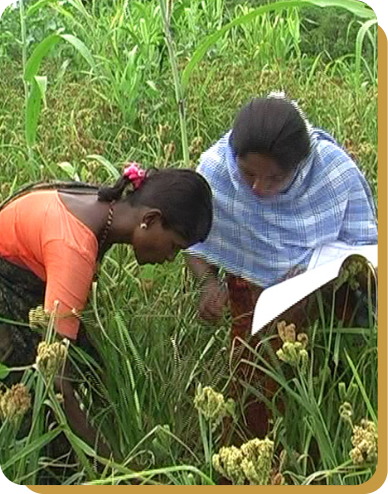Journey So Far
What Drives Us
Our Reach
Partners
Our Team
Awards and Recognitions
Journey So Far

Our work to empower the small scale and marginal farmers of India first began in 1994 with a simple effort to distribute indigenous seed varieties in and around the village of Thalli, Tamil Nadu. This soon turned into a growing biodiversity conservation programme that has been central to our work ever since.
Side by side with farmers, a lot of research was conducted in the initial years to understand the various characteristics of indigenous seed varieties. Close to a 100 different varieties of minor millets, dry land paddy and oil seeds were tracked down and brought back to the farm at Thalli for further experimentation. Within a period of 3 years, the number of farmers we reached out to had increased from 5 to 105.
Journey So Far
2023
Currently, we are working with more than 2400 small scale and marginal farmers around Karnataka, empowering them to attain food and economic security. More than 26 years after we were first established, we are still committed to our vision of a well-preserved, diverse ecosystem that will sustain the rural livelihoods of the present generation without eroding the resource base of the future.
2009
In 2009, GREEN consolidated its multi-pronged approach through the project ‘Community Based Biodiveristy Management – South Asia Programme’ (CBM-SA). The main objective of this project is in keeping with GREEN’s vision to enhance the livelihoods of farming communities thought increased food, nutritional and economic security.
2007
In 2007 the Participatory Guarantee System (PGS) of farmer certification was begun. PGS is particularly useful for small scale and marginal farmers who cannot afford expensive third party certification. Certification in organic farming greatly strengthens the economic security of farmers as they are able to fetch higher prices for their produce in competitive markets.
2006
By 2006, with the collaboration of other non-profits, our network had spread to 4 states of South India including Karnataka, Tamil Nadu, Andhra Pradesh and Kerala. The Foundation now expanded its focus to include using its extensive knowledge base and field experience to bring about policy changes that protected the rights of the individual farmer. With this in mind, GREEN Foundation, together with Kannada University organized ‘Seed Savers’ conference. Done in an effort to launch a campaign against the controversial seed bill tabled in parliament in 2004, the conference was among the first of many such initiatives by GREEN to bring about changes at a policy level.
Janadhanya, a farmers’ society, was also established in this year. Among its many objectives, this initiative also strengthened the movement for organic and sustainable agriculture at a grassroots level.
2005
In 2005 a community radio programme was developed in a defined cluster of villages as part of GREEN’s initiatives to spread the message of sustainable agriculture throughout the rural agrarian world. At a state level, GREEN worked together with All India Radio, Bangalore to develop a programme ‘Beeja Sampada’ that was broadcast throughout the state of Karnataka. Certification in organic farming for interested farmers was also begun in this year. GREEN engaged a certifying agency to train farmers and staff in organic farming guidelines on inspection and certification.
2004
In February of 2004, GREEN was awarded the ‘Equator Initiative Prize’ in recognition of its outstanding efforts for poverty reduction and biodiversity conservation. Our work had first begun with just a handful of women; nearly a decade later, the Foundation’s efforts had spread to 9 agro-climatic zones of Karnataka, impacting over 2400 farmers.
2002
By 2002 CSBs had evolved into a Community Seed Bank Network (CSBN). GREEN together with 15 other non-profit organizations from different agro-ecological zones across Karnataka formed a network across the state that would intensify biodiversity conservation efforts through seed banks. Kitchen gardens, where farmers grew vegetables in their back yards, were also extensively promoted. These not only increased the food security of families, but also brought about in-situ conservation of vegetable seed varieties. Here, the permaculture concept, with its sustainable land use design, was first introduced in over 13 villages and 60 gardens. Agroforestry and soil conservation efforts were also started in this year, with over 3000 trees of various forest species being planted. Since then, GREEN has intensified its efforts to improve the ecology of communities, introducing methods such as silt application, bund planting, nursery development etc to strengthen the biodiversity of its project areas.
2001
In 2001 the first Community Seed Bank (CSB) was established. This pioneering concept created a paradigm shift in our conservation efforts. Where earlier seed conservation was mainly the work of the organization, CSBs highlighted and tapped into the important role of communities in these efforts. It gave farmers a sense of ownership and empowered them to conserve their own seeds. This approach was essential in turning biodiversity conservation into a people’s movement. An organic farmers association, Sahaja Samruddha was also started in this year. The association focused on bringing together scores of like-minded farmers who wished to adopt sustainable practices by creating a platform that promoted organic farming and cultivation of indigenous crop varieties. One key aspect of CSBs was that it harnessed the role of women in agriculture as custodians of biodiversity. Our first steps as an organization were taken under the guiding hands of a handful of women; highlighting the role of women has always been close to the heart of the Foundation. Through CSBs, which are managed and run primarily by women, GREEN has sought to bridge the gender gap that still divides much of the Indian agrarian world.
1998
In February of 1998, ‘The COMPAS Project’ was officially launched. COMPAS (Comparing and Supporting Indigenous Agricultural Systems) attempted to understand the synergy between the social, spiritual and natural realms and their influence on agriculture. Spirituality is deeply ingrained in Indian agriculture and understanding this link is essential to unlocking traditional, sustainable agricultural methods. Through a participatory approach, GREEN worked to publish and disseminate centuries old knowledge stored in oral tradition.
1996
On 13th February 1996, Genetic Resource, Ecology, Energy and Nutrition (GREEN) Foundation was registered as a public charitable trust with the no. 906-95-96. From its very beginning, the Foundation has always used a holistic approach to empowering communities. Our activities centred on seed production, distribution and storage activities to enrich biodiversity through in-situ conservation. Varietal performance or ‘seed trials’ were conducted on farms to understand indigenous varieties and farmers’ response to them. We also initiated the set up of community farms with the aim of providing the most disadvantaged community members access to nutritious food. Seed fares were held to encourage community interaction and information exchange.
